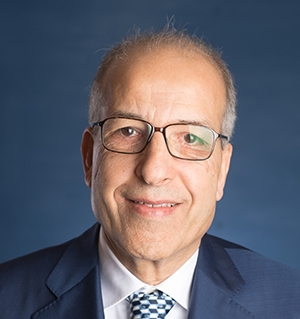Governor Saddek Elkaber of the Central Bank of Libya discusses the challenges of volatile oil revenue and rising inflation.

Global Finance: How is the recent turmoil in oil prices affecting Libya?
Saddek Elkaber: Oil constitutes over 96% of Libya’s exports and finances 95% of the budget. Disturbances in international markets therefore affect the Libyan economy directly.
The Russia-Ukraine crisis had a negative impact on commodity prices, but the rise in energy prices increased the proceeds from oil exports. This will positively reflect on Libya’s balance of payments and budget in 2022. It will also help the government and the CBL contain inflation, raise purchasing power and enact economic reforms—especially the fuel-subsidy policy reform, which will[MC1] gradually raise the prices of fuel on the local market and compensate citizens with a monetary allowance.
High volumes of oil resources also offer an opportunity to pump more investments into diversifying Libya’s sources of income and increase growth.
GF: What are the challenges associated with the distribution of oil revenue?
Elkaber: Since 2013, there are mainly political challenges as a result of the divisions and instability our country is going through.
The approach followed in distributing oil revenue is a legacy of the previous regime and excludes the private sector. Oil proceeds are managed by the public sector, which largely dominates the economy, providing basic services like health care, education and most jobs. Civil servants’ salaries represent over 50% of total public spending. In previous years, the budget was financed through deficit, meaning revenue wasn’t enough.
To avoid any ambiguities on the subject of fair distribution of oil revenue, the CBL adopted a new policy of transparency and disclosure in April 2022. This includes full disclosure of the state’s monthly revenue and details of public spending and foreign exchange expenditures. We believe this can change the perception among local and international observers.
GF: How are you managing inflation?
Elkaber: The main component of inflation is imported inflation resulting from the rise in prices of basic commodities on international markets. Libya relies heavily on foreign imports. As for local factors, they are limited, especially after the CBL adjusted the value of the Libyan dinar early 2021. With a stabilized exchange rate, inflation currently does not exceed 5.7%.
GF: The country is still divided. Financial institutions in Tripoli and Eastern Libya (Al-Bayda) started reunification work in 2020. What is the road map, and what the challenges are you still facing? What does that entail for Libyan commercial banks?
Elkaber: A detailed plan for reunification was drawn up with the support of international consultancy firm Deloitte and agreed upon. From our point of view, this will enhance the ability of the central bank to maintain financial and monetary stability. The CBL was committed to achieving the desired goals; however, our work was temporarily halted due to the recent political developments. Political divisions constitute the most important challenge to the success of the reunification process.
Reunification means a great deal to commercial banks, as they are the most affected by the division of the central bank. Early in 2021, we started to grant loans in installments to lenders based on the strength of their balances in Al-Bayda Bank. This measure contributed significantly to the provision of foreign exchange and reduced the number of rejected checks in the clearing system to 8% from 25% previously.
GF: How has Libya’s position in the international financial system evolved over the past few years? What are the prospects for the near future?
Elkaber: Despite the difficult conditions the CBL has faced these past years, we were able to maintain our position in the global financial system through continuous communication with international financial institutions and compliance with international standards, including all regulation regarding money laundering and terrorism financing. The CBL also maintained foreign currency reserves at levels that exceed international requirements.
Libya has strong economic potential and natural resources that can help diversify the economy, achieve political stability and bring prosperity in the future. The availability of huge hydrocarbon reserves and our proximity to international markets is an asset to attract foreign capital and expertise, especially given the current supply crisis.
Reconstruction needs after years of conflict is also an attractive opportunity for international companies operating in infrastructure, construction and energy sectors.
With a stable political framework, Libya could play a leading role in the economic integration of North and Sub-Saharan Africa. Our country could also be a gateway between Europe and Africa. Rather than a source of insecurity for its neighbors, Libya could become an active member of the international community.



